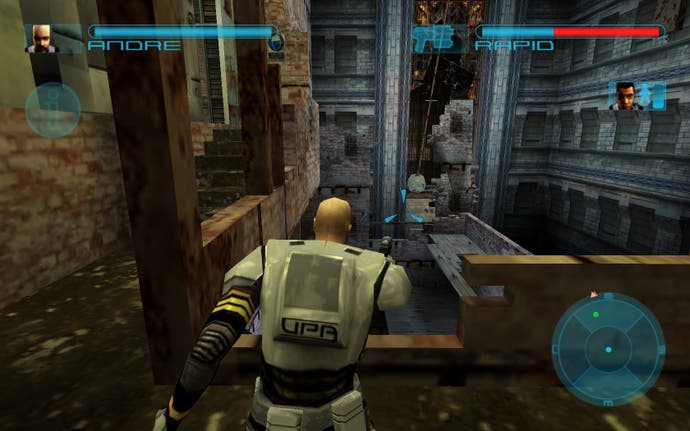Retrospective: Project Eden
Savage garden.
Games reveal a lot about humans. Action games? They exist because we can't get enough of violence. Experience points and achievements? Our brains are so hard-coded with the idea of incentives that we get a quiet, bottomless thrill from watching numbers increase. God games? Best not think about that one. But we must face up to the truth: as a species, we are fruity and doomed.
However, there is one noble trait that games expose about us, which is how we're drawn to explore. Look how compulsive roguelikes are. These are games which only ever end in you dying alone hundreds of feet beneath the world's surface, yet we find ourselves pulled down those same shadowy staircases over and over again. The unknown has a grip like a bear trap on our imagination.
It was Project Eden's roguelike narrative that I found most interesting back in 2001, and I still love it now. The idea is that in the future humanity takes to building cities vertically, with the stratospheric upper stories acting as the prime real estate and the endless lower levels gradually descending first into poverty, resentment, and finally abandonment.
Except something's stirring down there in the dark. The player in Project Eden controls an entire squad from the Urban Protection Agency, an organisation that comes across as quite slick despite being the worrying combination of a police force and call-out handymen.
The game opens with your guys en route to investigate the disappearance of a couple of technicians working at the Real Meat Company, where Something Has Gone Terribly Wrong. It quickly drags you further and further down.

You end up following the trail of the technicians down into the research lab of Real Meat. Then you follow their captors down into the unfinished building site beneath that. And then down, down and down again, through empty apartments, a barren car park, a looted shopping mall and much more, all with the creeping sense that you're leading your team further and further away from the gleaming safety of civilisation.
In a sense Project Eden was a game of urban exploration before it came into vogue and hipsters the world over began snagging their jeans on fences just to upload a photo of a water-damaged piano to Flickr. It's also a game with an emphasis on verticality before it became an industry buzzword.
At the time the only thing anybody had to say about Project Eden was that it was a spiritual successor to the ancient, venerable Blizzard game The Lost Vikings, which is partly true. The Lost Vikings gave players a team consisting of a fast viking with a pointy helmet (Erik), a fat viking with a shield (Olaf) and an angry viking with all the weapons (Baleog) and in requiring players to use these various abilities in tandem and in a careful order, it turned traditional-looking platform levels into intricate, head-scratching puzzles.
Going back, it's easy to see that Project Eden doesn't even come close to reaching the puzzle-related highs of The Lost Vikings. It never coughs up those glorious moments where you're left staring at all the pieces of a problem, mentally moving your team about like jigsaw pieces to try and solve it. But then, I'm not sure it's fair to compare the two directly. While solutions in Project Eden are almost always less chin-strokingly teasing and often rely on you simply spying something in your environment, they're also that much more believable.
You're not using Baleog to shoot an arrow at a switch so Erik can jump down and get a key which he'll give to Olaf who'll hang-glide down to a door that Baleog will run through and kill the monster on the other side so he can then pull a level that finally scratches Erik's arse. Project Eden wouldn't be seen dead prancing about arranging 14-step brainteasers like these.
Instead, it wants you to laboriously move a crane to fix a sparking control panel, or shoot out a wooden chock so a column falls down and becomes a bridge, or use a flying drone to turn off a conveyor belt from its distant control panel so you can run up it.








